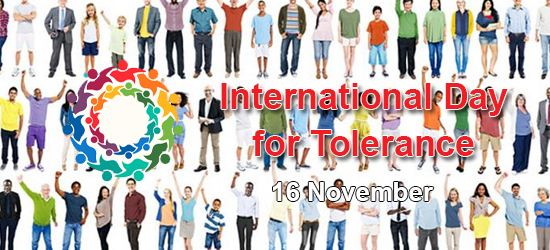International Day for Tolerance is a UN Day observed on November 16 to spread awareness about the importance of tolerance in society and to make people understand the negative effects of intolerance in our lives.
History of International Day of Tolerance
In 1996, the UN General Assembly adopted Resolution 51/95(link is external) proclaiming 16 November as International Day for Tolerance. This action followed the adoption of a Declaration of Principles on Tolerance by UNESCO's Member States on 16 November 1995.
UNESCO-Madanjeet Singh Prize for the Promotion of Tolerance and Non-Violence
In 1995, to mark the United Nations Year for Tolerance and the 125th anniversary of the birth of Mahatma Gandhi, UNESCO created a prize for the promotion of tolerance and non-violence. The UNESCO-Madanjeet Singh Prize for the Promotion of Tolerance and Non-Violence. The Prize is awarded for significant activities in the scientific, artistic, cultural or communication fields aimed at the promotion of a spirit of tolerance and non-violence.The prize is awarded every two years on the International Day for Tolerance, 16 November.
Madanjeet Singh was a great Indian diplomat, artist, writer and public figure. He was an internationally known author of several books on art and other subjects, closely interwoven with UNESCO’s programmes, principles and ideals. He served as Ambassador of India in Asia, South America, Africa and Europe. In recognition of his lifelong devotion to the cause of communal harmony and peace, UNESCO-Madanjeet Singh Prize for the Promotion of Tolerance and Non-Violence was instituted.
What is Tolerance?
Tolerance means the ability or willingness to tolerate the existence of opinions or behaviour that one dislikes or disagrees with. The world is composed of people from different backgrounds who speak various languages, and follow diverse customs and religions. Learning to be tolerant and respectful of others is key to being successful in life.
Tolerance recognizes the universal human rights and fundamental freedoms of others. People are naturally diverse; only tolerance can ensure the survival of mixed communities in every region of the globe.
Further Reading


Thank for all information
ReplyDelete